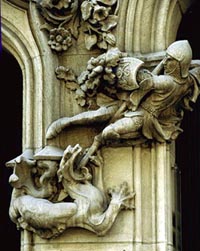Presenting History
CourageRanke has noted the importance of moral courage, of being honest with yourself and others about the sometimes unwelcome or distasteful things which careful research may reveal in the past:
"To accomplish anything in history there are three requirements: a sound understanding of people, courage, and honesty. The first, simply for insight into things; the second, not to be shocked at what one finds there; and the third, not to dissemble in any particular, even to oneself. So do the simplest moral qualities govern, even in science" (Diaries, c1843)
And if (for some reason) the truth you find is not one which you are yourself able to state, others may come forward. Here too, the best defense of history against those who wish it otherwise is a sustained effort; an equal resolve.
Sometimes that kind of courage takes a physical form. This was known to the ancients, as witness St George and the Dragon. One of its parables is in the Dzwo Jwan (Syang 25):
The Grand Historian wrote down in the record that Tswei Shu had assassinated his ruler. Master Tswei killed him. His younger brother restored the record, and then there were two people who had died in the attempt. His younger brother wrote it once again, and this time they let him off. A historian from the south had heard that the Grand Historian and his kin had all died, and had taken up his own bamboo tablets and set out, but when he heard that the record had been made, he went back.
History has its less leisurely moments. They require more than average fortitude. But as Ranke said, all history's moments require a significant amount of fortitude. In the end, like all the historian's virtues, fortitude must be collective in order to succeed. One is sometimes not enough.
17 Dec 2006 / Contact The Project / Exit to Outline Index Page
